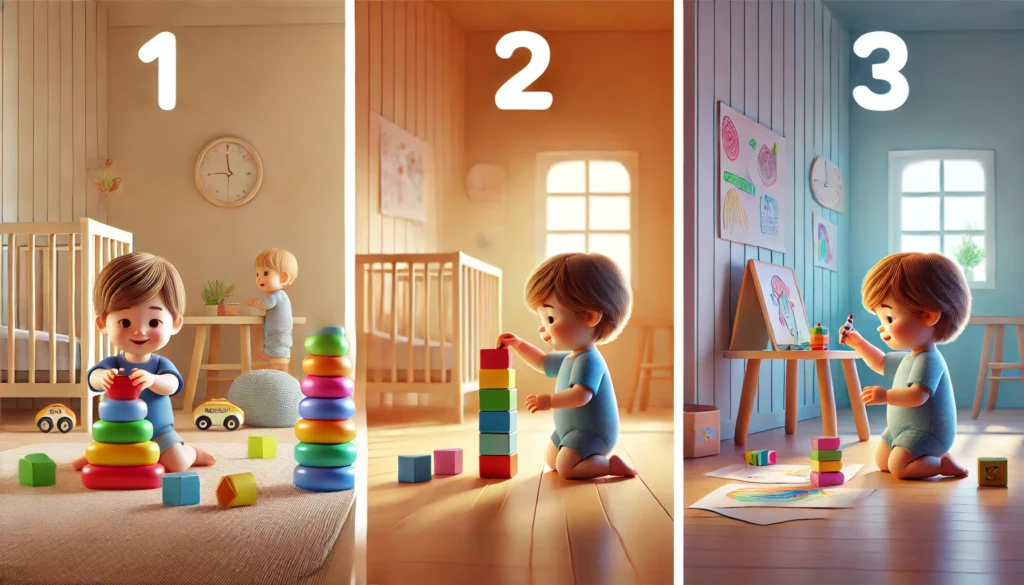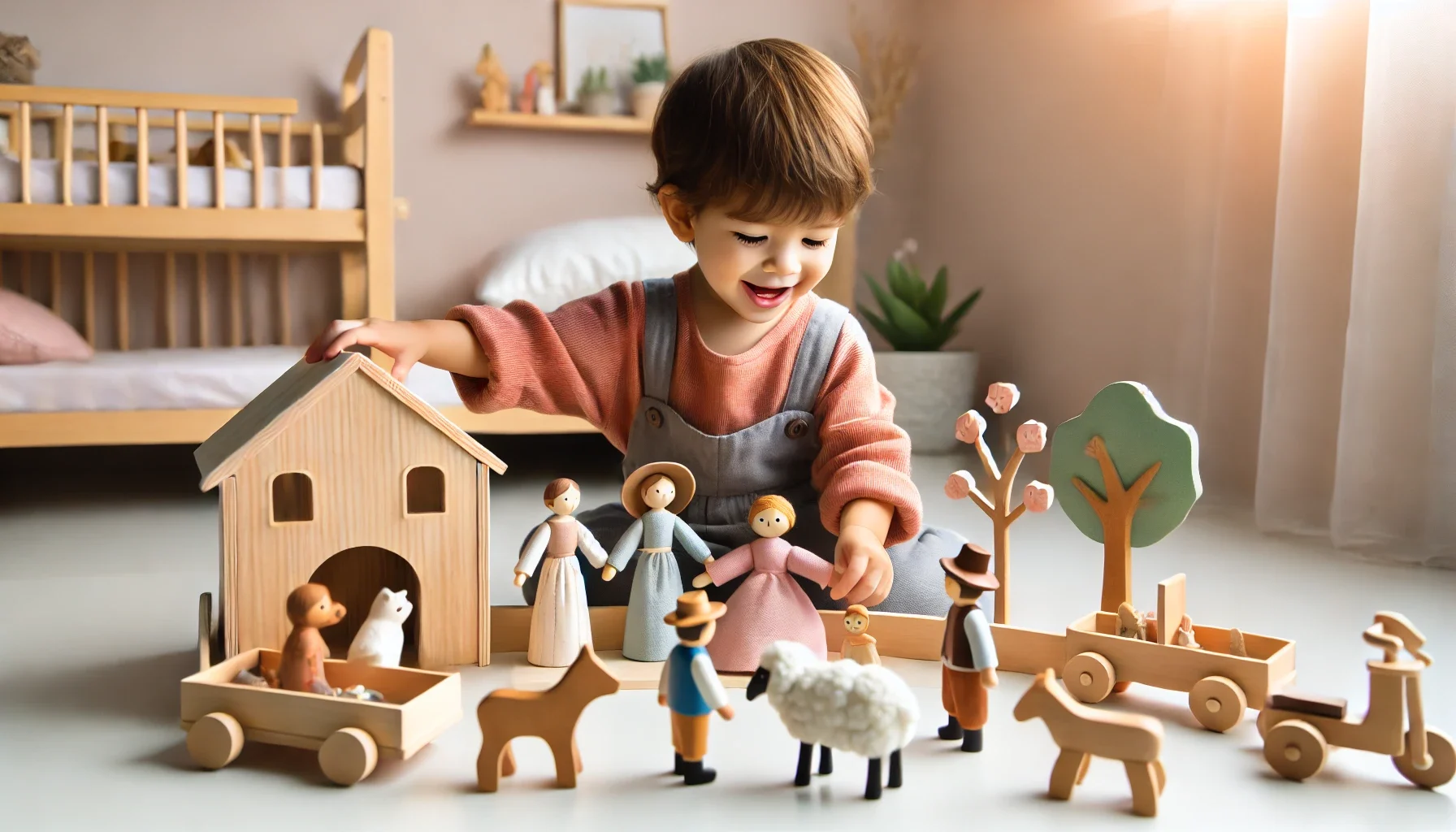Table of Contents
Article Summary
This article explores the importance of Montessori for toddlers and how Montessori toddler toys can boost your child’s development. You will learn about the key benefits of Montessori toddler play and the top recommended toys. You will also find here some practical tips for using Montessori principles to support your child’s learning and growth.
Introduction
The toys you choose can shape your child’s future. Montessori toddler toys offer a unique approach that encourages independence, creativity, and practical learning.Dr. Maria Montessori created this philosophy to help toddlers learn and grow at their own pace. It creates an environment where they can explore and develop new skills naturallyIn this article, we’ll explore the best Montessori toys for toddlers. We will discover essential learning milestones, and how these toys help toddlers grow both intellectually and emotionally.

Age Milestones of a Toddler
Toddlers are between 1 and 3 years old. During this time, they go through big changes that affect how they spend their future. The toddler could achieve these significant milestones:
- Motor Skills: Around 12-18 months, toddlers take their first steps, improving balance and coordination. By age 2, they can run, kick a ball, and begin climbing stairs. At 3 years old, many toddlers refine their fine motor skills, using utensils, stacking blocks, and drawing simple shapes.
- Cognitive Growth: The toddler years are crucial for brain development. Research from the American Academy of Pediatrics (AAP) highlights that by 18 months, toddlers understand cause-and-effect relationships. By age 3, they begin solving basic puzzles, recognizing colors, and following multi-step instructions.
- Language and Social Skills: Toddlers transition from babbling to speaking in short sentences. Studies from Harvard’s Center on the Developing Child show that a child’s vocabulary expands from about 50 words at 18 months to over 1,000 words by age 3. Socially, toddlers begin parallel play around age 2 and progress to cooperative play by age three , learning to share and express emotions.
- The Role of Montessori Toys: Experts like Dr. Maria Montessori emphasizes the importance of hands-on learning during these formative years. Montessori toddler activities, like sensory bins, stacking rings, and sorting games, enhance cognitive abilities such as memory and concentration. According to a 2017 study in Frontiers in Psychology, toddlers exposed to sensory-rich environments develop stronger problem-solving skills and better emotional regulation.

Parents can support their child’s development by offering age-appropriate toys and activities. This makes learning fun and meaningful.
Top Toys for Toddlers (Ages 1-3)
There are countless toys available for toddlers, but Montessori-inspired toys stand out due to their educational benefits. While traditional toys like blocks and dolls encourage basic skills such as motor development, Montessori toddler toys emphasize open-ended learning, fostering creativity and problem-solving skills.
Recommended Montessori Toys for Toddlers and their benefits(1-3 Years)
- Wooden Stacking Rings – Enhances fine motor skills, hand-eye coordination, and early problem-solving.
- Object Permanence Box – Helps toddlers develop focus and an understanding of object permanence, a key cognitive milestone.
- Pikler Triangle – Encourages gross motor skills, balance, and confidence in movement.
- Wooden Shape Sorter – Supports spatial awareness, problem-solving, and recognition of shapes and colours.
- Busy Board – Promotes hands-on exploration and practical life skills, such as buttoning, zipping, and switching latches.
- Montessori Cylinder Blocks – Improves fine motor control and introduces size differentiation and logical thinking.
- Toddler-Sized Practical Life Toys (for example child-safe pitchers, cleaning sets) – Develop independence, coordination, and real-world skills like pouring, sweeping, and sorting.

Why Montessori Toys Are More Effective
Montessori toys are specifically made to align with a child’s natural learning process. Unlike traditional toys that may be overstimulating with bright lights and sounds, Montessori toys have some extra features:
- Encourage Independent Learning: They allow toddlers to explore at their own pace, fostering a sense of autonomy.
- Promote Focus and Concentration: Studies, such as one published in Frontiers in Psychology (2017), indicate that children exposed to Montessori environments develop better attention spans and cognitive flexibility.
- Support Practical Life Skills: Many Montessori toys mimic real-world activities, helping toddlers gain confidence in daily tasks.
- Enhance Sensory and Cognitive Development: Montessori materials prioritize texture, shape, and weight, which stimulate a child’s senses and improve problem-solving skills.
Research has shown that toddlers raised with Montessori principles tend to display stronger self-regulation. These toddlers enhanced social skills, and better problem-solving abilities compared to peers using traditional toys. By choosing Montessori toys, parents can provide a foundation for lifelong learning while making playtime both fun and educational.
For more detail vist: Montessori Toys by Age: 10 Powerful Picks for Smart Play
The Benefits of Montessori Toddler Toys
Montessori toddler toys offer numerous benefits that support a child’s development in both cognitive and emotional domains. Let’s take a look at some of the key benefits:
- Encourages Independence
Montessori toddler toys promote self-sufficiency. By allowing children to explore and solve problems on their own. These toys foster a sense of accomplishment and confidence. - Boosts Cognitive Skills
Through activities like sorting, stacking, or matching, toddlers improve their problem-solving abilities, memory, and focus. These skills lay the foundation for more complex cognitive tasks as they grow. - Develops Fine Motor Skills
Montessori toys often require toddlers to manipulate objects with accuracy. Whether it’s pouring, stacking, or placing small objects, these activities help enhance fine motor coordination. - Promotes Emotional Growth
Montessori for toddlers encourages emotional intelligence. By engaging in solitary play or working with peers. Toddlers learn to manage emotions like frustration and joy, building emotional flexabilaty.
Research supports these benefits, with studies showing that Montessori environments contribute to long-term academic success, better problem-solving skills, and improved social interactions.
How to Choose the right Montessori Toddler Toys
When selecting Montessori toys for your toddler, it’s important to focus on their developmental stage. Choose toys that are both challenging and achievable for your toddler. For example, if your child is just beginning to walk. Choose toys that encourage balance and coordination, such as push toys or walk-behind toys. If your toddler is already using language skills, consider toys that support vocabulary development.
Avoid toys that are overly complex or require passive play, because they don’t promote independent problem-solving. It’s also important to limit distractions like excessive flashing lights or sounds, which can reduce your toddler’s ability to concentrate and engage meaningfully with the toy.
How Montessori Toys Help with Toddler’s Behavior and Managing Tantrums
Montessori toddler toys help in managing tantrums by providing children with calm and controlled activities. These toys help children focus their attention on a task, giving them a sense of accomplishment and reducing frustration. Montessori toys encourage independent play, helping toddlers learn to self-regulate their emotions. This can reduce their tantrums.
By fostering a sense of mastery and control, these toys teach toddlers that they can solve problems on their own, which enhances their confidence and emotional well-being.

How Montessori Toys Help a Toddler’s Learning and Playing
Montessori toys provide a unique learning experience by promoting self-directed play. When toddlers play with these toys, they gain a deeper understanding of cause and effect, spatial relationships, and basic mathematics (e.g. counting and sorting).
Additionally, Montessori toys encourage imaginative play, where toddlers can create their own stories and scenarios. This type of play helps toddlers develop social skills, creativity, and emotional intelligence. These toys prepare them for later academic learning and personal development.
How Montessori Toys Help Prepare Toddlers for Preschool Learning
Montessori toddler toys offer valuable skills that help prepare toddlers for preschool. From sorting shapes to understanding time concepts, these toys foster skills that are foundational for later academic success. They also introduce important concepts such as responsibility, organization, and independence, all of them are highlighted in preschool settings.

By promoting these skills early on, Montessori toddler toys can help children transition more easily into formal education, where these skills will continue to be developed and refined.
Tips for Parents Buying Montessori Toddler Toys
Here are some tips to help parents choose the best Montessori toddler toys for your child:
- Focus on Simplicity
Look for toys that are simple and functional. Avoid overly complicated toys with too many features or parts. - Choose High-Quality Materials
Choose toys made from natural, safe materials like wood or cotton to ensure durability and safety. - Encourage Hands-On Learning
Choose toys that engage your toddler’s senses and promote problem-solving. Toys that require manipulation or active engagement are ideal. - Observe Your Child’s Interests
Pay attention to what your child gravitates toward. Whether they love building, sorting, or pretend to play. You should choose toys that align with toddlers’ developmental needs.

Conclusion
Montessori toddler toys offer a unique, hands-on approach to learning that supports your toddler’s growth and development. From emphasizing cognitive skills to promoting emotional growth, these toys are a valuable tool for any parent. By incorporating Montessori principles into your toddler’s daily routine, you’re setting them on a path to becoming confident, independent learners.
Explore more about Montessori toddler toys and discover the best products available to support your child’s development today!












